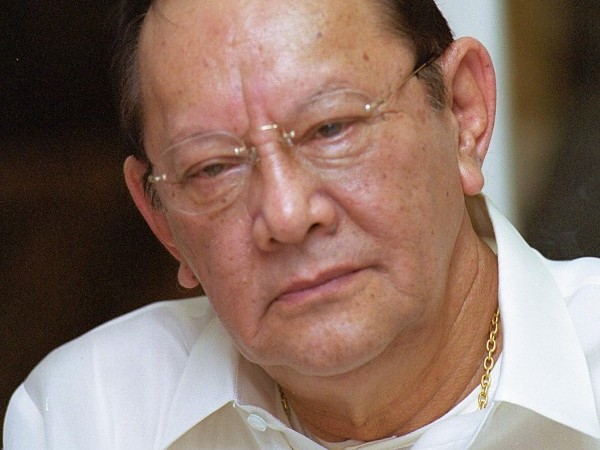Sandigan denies Danding’s bid to dismiss Marcos crony cases
The Sandiganbayan has denied the bid of businessman Eduardo “Danding” Cojuangco Jr. to dismiss his civil cases involving the allegedly ill-gotten wealth of late dictator Ferdinand Marcos.
In a resolution promulgated April 18, the anti-graft court Second Division found no merit in alleged crony Cojuangco’s bid to dismiss his civil cases because of the prosecutors’ inordinate delay.
Cojuangco is a respondent in Civil Case 0033 involving the dictator’s alleged ill-gotten wealth. This was divided into eight subcomplaints.
Cojuangco’s motions involved the dismissal of Civll Case 003-B (creation of companies out of coco levy funds), Civil Case 003-D (disadvantageous purchases and settlement of the accounts of oil mills from the coco levy funds), and Civil Case 003-H (behest loans and contracts).
READ: WHAT WENT BEFORE: PCGG and Marcos ill-gotten wealth
Article continues after this advertisementBehest loans pertain to loans granted to the businesses of alleged Marcos’ cronies.
Article continues after this advertisementIn Civil Case 003-H, Cojuangco allegedly received behest loans from Development Bank of the Philippines and Philippine Tourism Authority for the companies he controlled – Northern Cement Corp., Holiday Villages Philippines, and Coral Islands Resort and Development Corp.
In Civil Case 003-B and 003-D, Marcos stands accused of using the coco levy funds to benefit his own cronies. The dictator imposed a levy on coconut farmers with a promise to pool these funds to be used for the benefit of farmers, but these ended up with his cronies.
READ: Sandigan orders turnover of UCPB shares in coco levy case
The court said that in Civil Cases 003-B and 003-D, it took Cojuangco 12 years to file his motion to dismiss in 2015 since the plaintiff represented by the Presidential Commission on Good Government (PCGG) and the Office of the Solicitor General (OSG) filed its motions for partial summary judgment in 2002.
It also took Cojuangco a decade to file the same motion to dismiss since the court heard the plaintiff’s motions for partial summary judgment in 2005.
The time it took for Cojuangco to file his motions to dismiss meant he “slept” on his right to a speedy disposition of his cases, the court said.
“Analogous to the aforementioned cases, defendant Cojuangco Jr. slept on his right to a speedy disposition of cases for more than 12 years. Thus, his silence is deemed a waiver of such right,” the court said.
The court said the plaintiff’s motions for partial summary judgment are available legal remedies “not meant to delay the disposition of these cases.”
READ: Sandiganbayan thumbs down partial judgment on coco levy case
In Civil Case 0033-H, meanwhile, the court noted that it took Cojuangco two years since the dismissal of his motion to dismiss in 2013 to raise the issue of inordinate delay. Cojuangco claimed the prosecution has not made any action to commence trial since the court denied Cojuangco’s motion to dismiss.
The court also found “worthy to note” that not all pending incidents had been resolved then, such as the plaintiff’s motion for reconsideration on the decision to drop former defense minister Juan Ponce Enrile from Civil Case 003-H. The court recently affirmed its resolution dropping the former senator as an accused.
READ: Sandigan affirms ruling letting Enrile off the hook in Marcos behest case
“Therefore, the plaintiff is not yet expected to commence trial pending an incident for resolution,” the court said.
The court added that there was also no inordinate delay in the Civil Case 003-H proceedings especially because the plaintiff even filed two motions to accelerate the proceedings and resolve pending incidents.
“The filing of the same shows plaintiff’s interest in prosecuting the case,” the court said.
The court also noted that the delays prejudiced both the plaintiff and Cojuangco, but jurisprudence dictates that “securing the rights of the accused does not preclude the rights of public justice.”
While Cojuangco said the plaintiff seems not interested to proceed to trial since his lawyers’ 2014 meeting with the PCGG and OSG where they agreed to dispense with the proceedings, the court noted it’s only been a year since that meeting that Cojuangco filed the motion to dismiss accusing the plaintiff of inordinate delay.
In sum, the court said “there were no vexatious, capricious and oppressive delays in the proceedings of the subject cases,” and that the plaintiff only exercised its legal remedies not intended to delay the proceedings.
“Based on the foregoing, the Court finds that the instant cases cannot be dismissed for the alleged violation of defendant’s right to a speedy disposition of cases,” the court ruled.
The resolution was penned by Associate Justice Michael Frederick Musngi and concurred in by division chairperson Associate Justice Oscar Herrera Jr. and Associate Justice Zaldy Trespeses.
Marcos’ civil cases are survived by his wife, former first lady now Ilocos Norte Rep. Imelda Marcos, his cronies, and his heirs. IDL/rga
